The views expressed in our content reflect individual perspectives and do not represent the authoritative views of the Baha'i Faith.
In discussions about the equality of women and men, people often overlook the distinction between gender and sex. Many students experienced “aha!” moments in my college course “Gender in Communication” when they appreciated the difference – here’s why:
Humans, as biological mammals, are of two sexes – male and female – a requirement for reproducing our species. Yes, a small minority are born with indeterminate sex organs, some of whom can’t easily be classified as either. This is biological science.
Also, culturally there are primarily two genders – masculine and feminine – associated with the two sexes. But what’s considered masculine or feminine varies throughout the world and across time. This is social science.
Note the language in the 1972 American Equal Rights Amendment proposal, “Equality of rights under the law shall not be denied or abridged by the United States or by any State on account of sex.”
RELATED: Women: An Antidote for War
The Equality of the Sexes
The Baha’i teachings call for the equality of the sexes:
Man, beast, or vegetable, all the things of these three kingdoms are of two sexes, and there is absolute equality between them.
In the vegetable world there are male plants and female plants; they have equal rights, and possess an equal share of the beauty of their species; though indeed the tree that bears fruit might be said to be superior to that which is unfruitful.
In the animal kingdom we see that the male and the female have equal rights; and that they each share the advantages of their kind.
Now in the two lower kingdoms of nature we have seen that there is no question of the superiority of one sex over the other. In the world of humanity we find a great difference; the female sex is treated as though inferior, and is not allowed equal rights and privileges. This condition is due not to nature, but to education. In the Divine Creation there is no such distinction. Neither sex is superior to the other in the sight of God.
But regarding this important subject, current popular discourse now often uses the term “gender,” which can muddle the issue. Gender – a cultural role designation – differs throughout the world. It has long been policed by cultural pressures and self-designated “gender cops,” an expression used particularly with regard to masculinity.
Growing up during mid-20th century in the United States, I absorbed loads of gendered messages about how girls and boys should behave – some tacit and some verbalized. Girls wore dresses to school, boys wore pants. Textbooks referred to most professionals, government leaders, professors, and doctors – plus mailmen, firemen, policemen — as “he,” whereas nurses, secretaries and teachers were always “she.” Boys weren’t supposed to cry or be sissies. Girls were expected to do both, as well as be squeamish and fearful. Boys played sports, girls played with dolls. Boys were good at math and science, girls were good at nurturing and language skills, and would never be great at anything. Many of these ascriptions differed by race and income level, as well.
Clarifying the Distinction Between Sex and Gender
In fact, clarifying the distinction between sex and gender has helped sex equality to progress somewhat since I was a child. Recognizing violence as part of a destructive male mindset, female scholars and thinkers during the 1960s-1970s second-wave feminism sought to liberate men from masculinity monitoring. But the male-dominated power structure thought women who violated their feminine roles actually wanted to be men and, if successful, would oppress men as men had oppressed women for centuries.
In other words, many men – and women – could not imagine an alternative paradigm to the dominant society’s prescribed gender roles. A huge backlash made feminism such a dirty word that some people are still reluctant to subscribe to it. Even the attempt to collapse Mrs. and Miss into the one title Ms. – to parallel the one title Mr., which doesn’t refer to marital status – was misunderstood and maligned. In a talk he gave in the United States in 1912, Abdu’l-Baha – the son and successor of Baha’u’llah, who founded the Baha’i Faith – addressed this issue when he said:
In brief, the assumption of superiority by man will continue to be depressing to the ambition of woman, as if her attainment to equality was creationally impossible; woman’s aspiration toward advancement will be checked by it, and she will gradually become hopeless …
The Masculine Assumption of Superiority
In brief, despite the advances of women’s suffrage and female educational empowerment, many people came to abandon the distinction between sex and gender and in doing so, tacitly accepted the masculine assumption of superiority. As a result, many women began to view professional and economic success in masculine terms, disavowing qualities ascribed to femininity and further acquiescing to the tools of masculine discourse. That is, they set out to compete with men using masculine definitions of leadership, success and other values.
One line of thinking about how characteristics of masculinity and femininity are apportioned holds that in the distant past when it was determined that certain characteristics were necessary in a warrior, it made sense that the task of a warrior should belong to males who weren’t the child-bearers. Characteristics were taught from childhood and evolved into behavior, values, and defined roles for men and for masculinity itself, such as courage, strength, strategic thinking, and fearlessness. If males exhibited weakness, timidity, compassion, nurturing, sensitivity or gentleness they’d be shamed and ridiculed as girlish or un-masculine. Thus, characteristics men learned to view as negative were ascribed to women.
Men, Women, and War
These roles, the Baha’i teachings say, were especially conditioned by the historical prevalence of war:
The woman who is asked to arm herself and kill her fellow creatures will say, “I cannot.” Is this to be considered a fault and lack of qualification as man’s equal? Yet be it known that if woman had been taught and trained in the military science of slaughter, she would have been the equivalent of man even in this accomplishment. But God forbid! May woman never attain this proficiency; may she never wield weapons of war, for the destruction of humanity is not a glorious achievement. The upbuilding of a home, the bringing of joy and comfort into human hearts are truly glories of mankind. Let not a man glory in this, that he can kill his fellow creatures; nay, rather, let him glory in this, that he can love them.
Women who have worked in the defense industry have some interesting insights to offer. In one example, a woman on a particular committee in U.S. National Security had thought she could perhaps change the discourse, but discovered that if she brought up particulars like bodies, human lives, and emotions, she was ignored. For example the term “collateral damage” sounds like the destruction of brick and mortar, but is typically used to describe un-targeted deaths, often of women and children. Her colleagues considered her a wimp, just like any other weak opponent. Another writer reported that “acting like a wimp” became a reason for choosing a more masculine military tactic.
RELATED: The Warrior Hypothesis: Do Men Want War More than Women?
In this sense, Abdu’l-Baha pointed out, the equality of the sexes can lead the entire world toward a peaceful future:
Equality between men and women is conducive to the abolition of warfare for the reason that women will never be willing to sanction it. Mothers will not give their sons as sacrifices upon the battlefield after twenty years of anxiety and loving devotion in rearing them from infancy, no matter what cause they are called upon to defend. There is no doubt that when women obtain equality of rights, war will entirely cease among mankind.
The current discourse about women’s involvement in military combat is the opposite of sex equality. For hundreds if not thousands of years, women have largely been denied access to decision-making on governmental policies. In the US, women are still in the minority at all levels of government, and thus have little say in decisions concerning national policy, diplomacy, priorities and so on. The military is a male-designed institution: women who participate in it must play by its rules.
The Baha’i teachings say that these militaristic definitions of masculinity and femininity are now changing, as the entire world goes through a re-definition of what it means to be a woman or a man. In J.E. Esslemont’s book Baha’u’llah and the New Era Abdu’l-Baha is quoted as saying:
The world in the past has been ruled by force, and man has dominated over woman by reason of his more forceful and aggressive qualities both of body and mind. But the balance is already shifting; force is losing its dominance, and mental alertness, intuition, and the spiritual qualities of love and service, in which woman is strong, are gaining ascendancy. Hence the new age will be less masculine and more permeated with the feminine ideals, or, to speak more exactly, will be an age in which the masculine and feminine elements of civilization will be more evenly balanced.
Change is slow, but we are making some progress. Increasingly, couples with children consciously divide up traditionally gendered tasks – jointly deciding who will cook, clean, earn the main salary, change the diapers and so on, while not allowing their sex to determine their traditional gender roles. As these trends toward the redefinition of gendered roles continues, and as the equality of the sexes increasingly becomes the norm, we work our way toward a less warlike world.




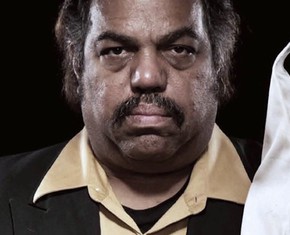




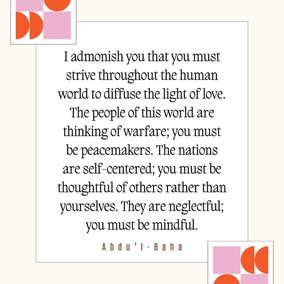
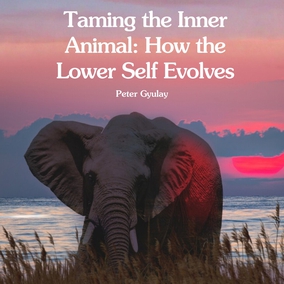
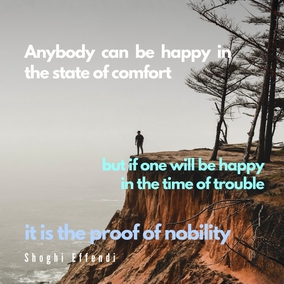

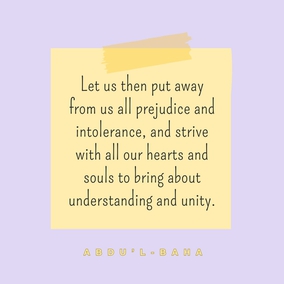


Comments
Sign in or create an account
Continue with Googleor